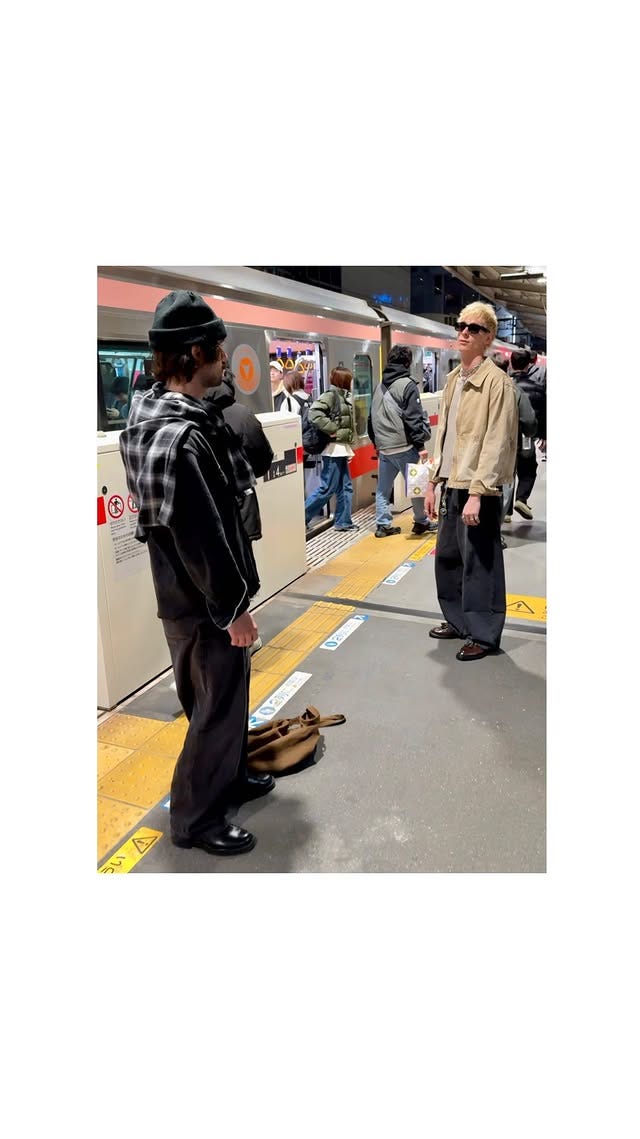Idk why, but I feel like I’ve been laughing more than usual lately.
But not like the sane kind of laughter - the one that you do in groups in public and with other people.
I mean like, just letting out a strong guffaw just in the middle of cooking some eggs. Alone. Maybe it’s the (*checks calendar* - still) dark and cold months which force me to cling onto any sources of warmth. Or maybe it’s a vitamin D deficiency from lack of sun, but I have really been into laughing lately.
Last post, I wrote about how I show love through being self critical. Most people who know me irl are aware that I also show love through a different, funner form - through sharing laughter. Humor is something that I have deeply cherished since my childhood, so it’s fun to examine how my relationship with it has changed over the years. These days, I use humor to practice humility, process things, to connect with people, and generally navigate being an adult.
However, laughter wasn’t always something I practiced socially. In fact, it was one of the ways I first learned how to connect with myself. As a socially awkward immigrant kid, there were a lot of lonely times. Moving countries, then states, then cities and school districts (I think I averaged ~1 new school a year before I hit middle school) meant not having a consistent source of friends. The inner voice in my head was one of the few invariants in a sea of changes through childhood. I wasn’t sure how to best engage with this overly active voice until I realized I could make it laugh. And, when I also learned that laughing at things was a fantastic way of processing new changes in life, it was only natural that my inner voice would become my favorite comedian.
All of the new changes - the way people talked, what they had for lunch, what they did at recess (tetherball remains the wildest social phenomenon I have ever experienced to this day) - were all strange. So they were funny. At least to me. Processing out-of-place things through humor came naturally to me, and was a welcome distraction from instead seeing everything as foreign and uninviting. Being an immigrant means learning a million different ways to be resourceful. Humor was one way of extracting what I needed (a valuable connection) from what I had (my inner voice).
Of course - this isn’t at all a unique story. The loneliness I had in elementary school was replaced by friendship when I realized that other kids also had the same exact challenges as me. Or, well, maybe I hadn’t realized it at that point. But I did get my first taste of unconditional acceptance. Laughter was the earliest meaningful social activity I engaged in. Sharing laughter was my way of knowing that I was given permission to exist as I was. That, at least for the duration of passing period, lunch, or waiting for my ride home, I could take a break from the impossible task of trying to fit in in an ever-changing environment. I could instead get lost in the mind numbingly brilliant wisdom that comes from prepubescent brains. It was an exercise in being present - all that was required of me was to engage.
It’s interesting revisiting this as an adult. I value vulnerability a lot more these days, and laughter was particularly good at disarming the bravado of my 11-year-old self. Spoiler alert, but it’s also fun knowing that I still maintain a handful of these friendships today. And I value them much differently than any other bonds.
~2010
This vehicle for connection worked even better in high school than it did in middle school. The things high schoolers find funny are marginally more wholesome and sophisticated than what middle schoolers find funny. I got even more into laughter in college, but that was when I discovered the other end of the balance.
A lot of the humor in college was oriented around self-deprecation. In a time where people were purportedly in the growth mindset, there was also a ton of insecurity. Instead of being a medium through which I connected with people, humor became a crutch. I defaulted to jokes when I was too afraid of truly talking about or examining myself. The “no strings attached in middle school” was perhaps a bit too lenient in college. Becoming an independent adult meant being aware of social norms I hadn’t been privy to as a teenager.
And that opened up the door for utilizing the powers of humor for bad - of using humor to obfuscate vulnerability.
It’s fun to laugh or make jokes about how shitty your day is. And that works for 90% of the time. After all, what’s the value of our daily struggles if it’s not fodder for our friends to laugh about it? But for the other 10% of the time, making jokes about things when I instead would have much more appreciated help, support, or a listening ear, humor was really detrimental.
This only became evident enough for me to realize during the pandemic. I knew a lot of people I wanted to connect (or maintain connections) with, but I couldn’t. It was all too easy to fall into the trap of having my all my interactions with people become a string of jokes instead of any meaningful interaction. That’s what made those times particularly isolating.
~2015
But now that we’ve been irl for a while, humor has been making a comeback. Hence the laughing while making eggs. Like being reacquainted with a long lost old friend, reintroducing humor into my life has only strengthened my bond with it. Despite its potential for bad, I still engage with laughter and appreciate it in all of the ways I did before, only now with additional nuances of understanding.
Aside from entertainment to accompany my cooking, I use laughter in 3 pretty big areas of my life today:
Navigating conversations.
The sheer number of people I’ve met through my 2 years in New York has taught me just how exhausting it is to do the <where do you live / what do you do for work / where are you from> dance when introducing myself to new people. While I am genuinely curious about the multitudes of people in this city, making small talk is a chore. Humor helps me sidestep this useless social ritual. It let’s me signal that I 🎉don’t care🎉 about answers to any of the dreaded 3 questions™️. Tell me instead about your life — what broke you, what fixed you, what’s otherwise actually on your mind? If someone does insist on social niceties, I’ve encountered these questions enough times that I have my ready-to-go responses for most situations. I’ll let you ask me ask me what neighborhood I live in, but if you do, I will ask you the same question in return (out of obligation). And when you tell me you live in Brooklyn, I’ll make some quip about you being broke/a hipster/ an adult baby. Conversations where I’ve managed to get someone to laugh means I’ve managed to get someone to relax. That makes it easier for both of us show our true selves, and open ourselves up to connecting in ways which would not have been otherwise possible.
Making people feel seen.
Expressing appreciation in easy-to-digest forms is boring. Giving out too much unchecked positivity makes me feel schmoozy or insincere. Humor can be the bread to complete an appreciation sandwich, one which balances and completes the filling. To roast someone is to give them proof that I’ve been spending mental energy on perceiving them. Giving out a cookie-cutter complement is easy and cheap to do. Making a joke about someone that’s specific and custom fitted to them, one which calls out an imperfection, a quirk, something they said in a previous conversation? That’s much harder because it requires listening and seeing them.
Helping me not take myself too seriously.
Last post, I wrote about my reflections through doing my yearly ritual of reading through my journal entries. This ritual always reminds me of how often I overestimate how big of a deal things are in the moment, but how I forget about them a few weeks later. Making fun of daily struggles is a reminder that future me a month from now likely won’t take whatever I’m struggling with today too seriously. So why should present me? Laughing at things is always a lot more fun than stressing at it. And typically, also about as useful.
Today
So yea, I guess my relationship with laughter actually does go pretty deep. If you see me randomly laughing like an insane person, know that I now have a substack post which explains why. This makes me seem slightly less insane. Last post, I ended with appreciating the people who came into my life last year. In this post, I’d like to end with appreciating my day ones. Friends who accepted the oldest version of me are the ones I feel truly comfortable in calling unconditional.






I now see what you meant by using laughter to evade solving your problems. Keep writing - excited to see your next piece!
enjoyed this!! especially this line: "To roast someone is to give them proof that I’ve been spending mental energy on perceiving them."
this is exactly how i feel about this too!